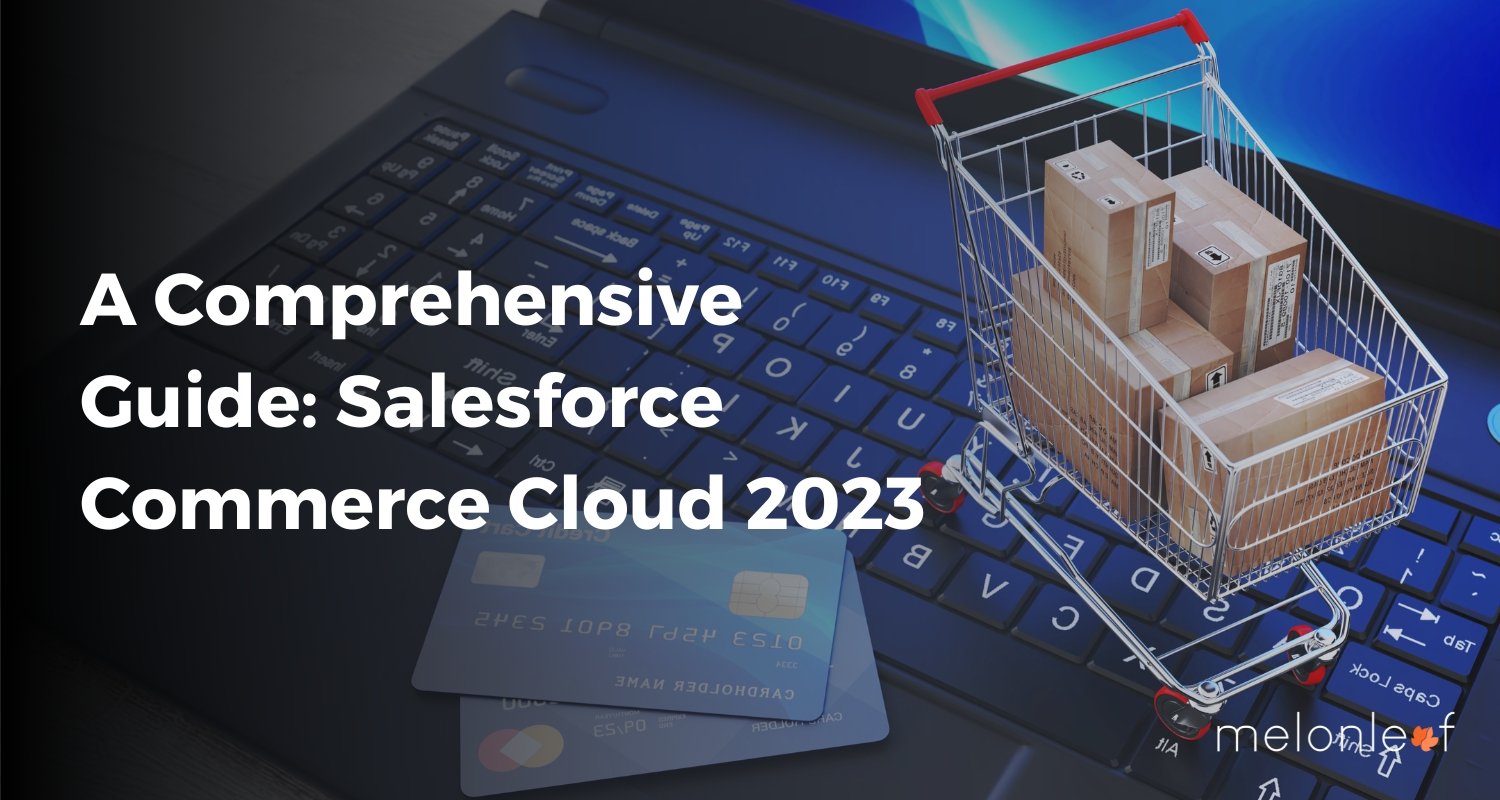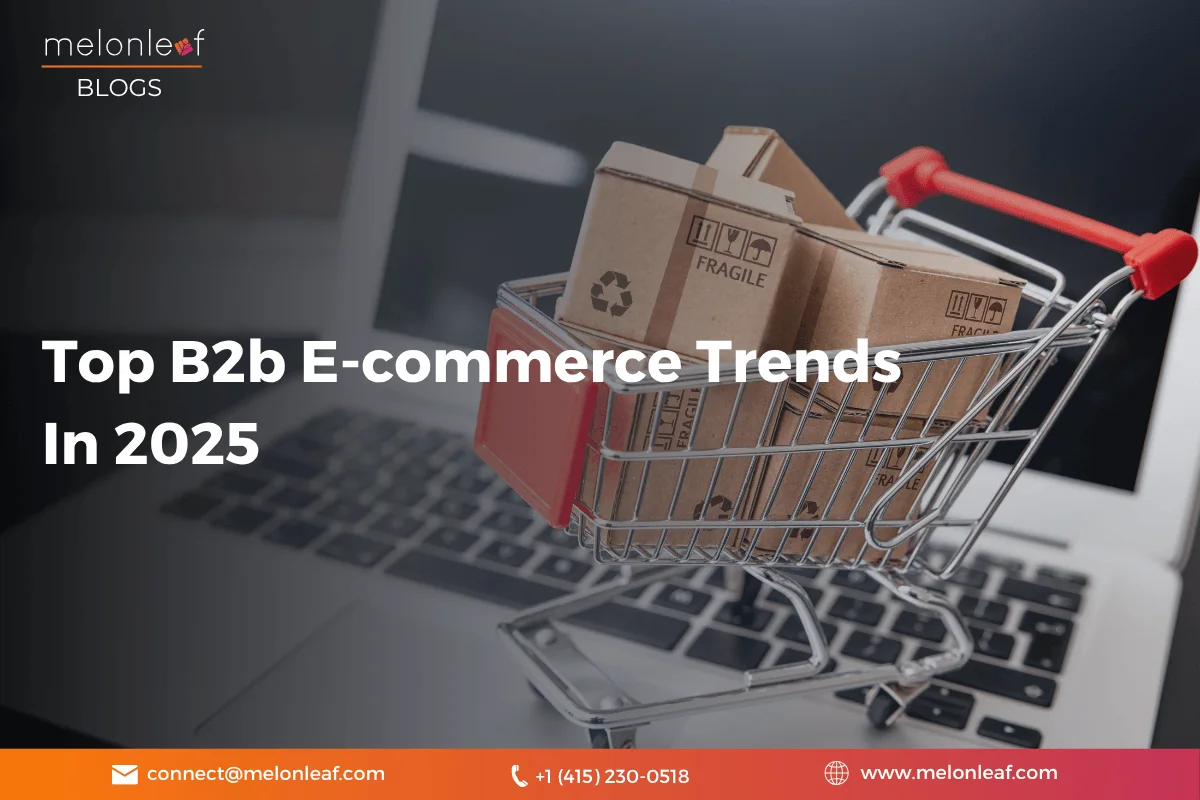

A Comprehensive Guide to Salesforce Commerce Cloud 2023
The challenge at hand is difficult: to improve the client experience and stand out in a crowded marketplace. Despite these difficulties, there is a ray of optimism for e-commerce firms. The pandemic-induced surge in internet buying shows no signs of abating. People are more excited about online buying than ever before, bringing up a world of limitless opportunities for e-commerce enterprises.
In fact, according to the State Commerce report, a whopping 54% of commerce revenue is projected to be driven digitally by 2024. This indicates a steady rise in the number of online shoppers in the years to come.
In this dynamic landscape, one powerful tool stands out as a game-changer for online retailers, offering them a competitive edge: Salesforce Commerce Cloud (SFCC). SFCC simplifies the art of crafting a seamless customer experience across various touchpoints, be it on the web, mobile, social platforms, or even offline stores.
This is your comprehensive guide to Salesforce Commerce Cloud (SFCC), equipping you with the knowledge needed to understand how this potent tool can help your online business not just survive but thrive. So, without further ado, let's dive in and explore the transformative world of SFCC.
What Is Salesforce Commerce Cloud?
Formally known as Demandware, Salesforce Commerce Cloud has evolved into a robust cloud-based service that revolutionizes how businesses connect with consumers across various devices and channels. Salesforce Commerce Cloud stands as a versatile multi-tenant cloud platform that seamlessly bridges the gap between businesses and their customers, regardless of the platform or device.
Powered by the cloud, Salesforce Commerce Cloud empowers companies to craft captivating online experiences that effortlessly transform casual visitors into loyal customers. Featuring cutting-edge components such as Einstein AI, Commerce Cloud Digital, Storefront Reference Architecture, and seamless order management capabilities, SFCC provides online businesses with the means to orchestrate their operations for maximum profitability.
With Commerce Cloud, you can build personalised online experiences that keep consumers coming back for more, all while making it appear straightforward. This all-in-one solution meets both B2B and B2C requirements, giving online retailers total control over their digital marketplaces.
SFCC is a one-stop shop for growing your online business, providing a plethora of tools for marketing, sales, content management, automation, reporting, and even predictive intelligence, all personalised to your needs.
8 Unique Features Of Salesforce Commerce Cloud
Salesforce Commerce Cloud is packed with innovative and distinctive features that set it apart from other e-commerce platforms. Let's dive into the eight unique characteristics that make it a game-changer for online businesses:
Omnichannel Excellence
Salesforce Commerce Cloud excels in creating a unified shopping experience across various channels and devices, seamlessly connecting your online and offline stores. This ensures that your customers enjoy a consistent and personalized journey.
Einstein AI Integration
Harness the power of artificial intelligence with Einstein, Salesforce's AI tool. It empowers you to offer product recommendations, personalized content, and predictive analytics, enhancing customer engagement and driving sales.
Endless Scalability
SFCC is designed to grow your business. Whether you're a small startup or a global enterprise, the platform's scalable architecture ensures you can adapt to changing demands and expand without hassle.
Customization Options
Tailor your online store to perfection with Salesforce Commerce Cloud's robust customization features. You have the freedom to create a unique and branded shopping experience that reflects your business identity.
Seamless Order Management
Managing orders has never been easier. SFCC provides efficient order management capabilities, streamlining the entire process, from order creation to fulfilment, and ensuring customer satisfaction every step of the way.
Comprehensive Reporting and Analytics
Data is your ally in making informed decisions. The platform offers in-depth reporting and analytics tools, enabling you to track performance, gain insights, and refine your strategies for continuous improvement.
Cross-Device Consistency
Your customers may shop from desktops, smartphones, or tablets. Salesforce Commerce Cloud ensures that your website is responsive and visually appealing on all these devices, enhancing the customer experience.
Marketing Automation
Boost your marketing efforts with automation. SFCC simplifies your marketing tasks, from email campaigns to promotional content, ensuring that you reach your target audience effectively and efficiently.
Incorporating these eight unique features into your e-commerce strategy with Salesforce Commerce Cloud can take your online business to the next level, providing a competitive edge in a dynamic digital marketplace.
6 Benefits Of Salesforce Commerce Cloud For Your Business
Seamless Customer Experiences
Salesforce Commerce Cloud is a game-changer when it comes to providing your customers with seamless and personalized experiences. With features like omnichannel excellence and Einstein AI integration, you can deliver a consistent shopping journey across various devices and channels. This translates into happy customers who keep coming back for more.
Scalability for Growth
Whether you're just starting or you're an established enterprise, Salesforce Commerce Cloud can scale to meet your business needs. You won't outgrow the platform, making it the perfect choice for businesses with ambitious growth plans.
Customization and Branding
Your online store should reflect your brand identity, and Salesforce Commerce Cloud offers robust customization options. Tailor your store to perfection, creating a unique shopping experience that resonates with your target audience.
Efficient Order Management
Managing orders has never been easier. Salesforce Commerce Cloud streamlines the entire order management process, from order creation to fulfilment. This ensures a smooth and reliable experience for both you and your customers.
Data-Driven Decision Making
The platform has full reporting and analytics features, allowing you to make data-driven choices. To remain ahead of the competition, you may track performance, get useful insights, and constantly adjust your plans.
Marketing Automation
Boost your marketing efforts with Salesforce Commerce Cloud's automation features. From email campaigns to promotional content, the platform simplifies your marketing tasks, ensuring you reach your target audience effectively and efficiently.
By leveraging these unique benefits of Salesforce Commerce Cloud, your business can thrive in the competitive world of e-commerce, delivering exceptional experiences and driving growth and profitability.
Implementation Process Of Salesforce Commerce Cloud
Assessment and Planning
- Identify your business goals and objectives for implementing Salesforce Commerce Cloud.
- Assess your current e-commerce setup and identify pain points and areas for improvement.
- Assemble a dedicated implementation team that includes project managers, developers, designers, and other relevant stakeholders.
- Develop a comprehensive project plan that outlines timelines, budgets, and milestones.
Platform Selection
- Choose the appropriate edition of Salesforce Commerce Cloud based on your business needs.
- Collaborate with Salesforce representatives to understand licensing, pricing, and any specific requirements for your business.
Design and Customization
- Work on developing and customising your online store to fit your business identity. This involves developing a user-friendly layout, adding product catalogues, and including design aspects that are appealing to your target demographic.
Data Migration
- Migrate your existing product data, customer data, and other essential information to the Salesforce Commerce Cloud platform.
- Ensure data accuracy and completeness during the migration process.
Integration
- Integrate Salesforce Commerce Cloud with other systems, such as CRM, ERP, payment gateways, and third-party applications, to streamline operations and data flow.
Development and Testing
- Develop and configure features, including shopping cart functionality, product recommendations, and payment processing.
- Extensive testing is crucial to identify and resolve any issues. Conduct quality assurance testing to ensure the website's functionality, performance, and security.
Training and Onboarding
- Train your team members on how to use and manage the Salesforce Commerce Cloud platform effectively.
- Provide training materials and resources for ongoing support.
Go-Live and Launch
- Launch your online store on Salesforce Commerce Cloud. Ensure that your website is fully operational, secure, and ready for customer transactions.
- Communicate the launch to your audience and promote the new platform.
Post-Implementation Support
- Continue to monitor the platform's performance and address any issues or glitches as they arise.
- Gather feedback from users to make improvements and optimizations.
- Stay updated with Salesforce Commerce Cloud updates and new features to maximize the platform's benefits.
Continuous Optimization
- Review and optimise your e-commerce strategy on Salesforce Commerce Cloud on a regular basis.
- Analyse data, run marketing campaigns and experiment with new features to improve user experience and promote business development.
To guarantee a successful transition to Salesforce Commerce Cloud, it is critical to maintain open communication and cooperation between your team and Salesforce professionals throughout the installation process.
Tips To Choose The Right Salesforce Commerce Implementation Partner
Define Your Goals and Requirements
Clearly outline your e-commerce goals, specific requirements, and the scope of your project. Understanding what you need is the first step in finding the right partner.
Experience and Expertise
Look for a partner with a proven track record of successful Salesforce Commerce Cloud implementations. Experience matters, especially if you have complex requirements.
Certifications and Partnerships
Ensure the partner holds relevant certifications and partnerships with Salesforce. Certifications validate their expertise, and partnerships indicate their commitment to the platform.
Industry Knowledge
Choose a partner with experience in your industry. They should understand your business's unique challenges, customer expectations, and market dynamics.
Client References
Request client references or case studies to gauge the partner's past performance. Speak to their previous clients to get insights into their working style and results.
Scalability and Flexibility
Consider a partner who can scale their services as your business grows. They should also offer flexibility to adapt to changing requirements.
Project Timeline and Communication
Discuss the project timeline and ensure it aligns with your business goals. Clear and effective communication is essential for a successful partnership.
Team Expertise
Assess the team that will work on your project. Ensure they have the necessary skills and experience, from developers to project managers.
In-House vs Outsourced Development
Clarify if the partner uses in-house resources or outsources development. In-house teams often provide better control and communication.
Support and Maintenance
Inquire about post-implementation support and maintenance services. Your partner should be there to assist with any issues that arise after the project is live.
Cost and Budget
Clearly define your budget constraints and discuss pricing with potential partners. Ensure there are no hidden costs or surprises.
Transparency and Communication
Choose a partner who values transparency and maintains open lines of communication. Regular project updates and feedback sessions are crucial.
Innovation and Future-Readiness
Your partner should have a forward-looking approach, staying updated on new features and technologies related to Salesforce Commerce Cloud.
Legal and Contractual Details
Carefully review the contract and its terms, including service level agreements (SLAs), responsibilities, and exit clauses.
Cultural Fit
Assess whether the partner's company culture aligns with your organization's values and goals. A good cultural fit can lead to a more productive and harmonious partnership.
Challenges You Can Solve with Salesforce Commerce Cloud
Salesforce Commerce Cloud offers an array of solutions to address the myriad challenges faced by e-commerce businesses. These challenges can vary widely, from providing a consistent customer experience to adapting to changing market dynamics. Below, we delve into some common obstacles that can be effectively overcome with Salesforce Commerce Cloud:
- Inconsistent Customer Experience: The digital marketplace is a dynamic landscape where customers interact with your brand through various touchpoints – websites, mobile apps, social media, and more. Keeping the customer experience consistent across these diverse channels is a substantial challenge. Salesforce Commerce Cloud simplifies this by providing a unified platform that ensures a seamless, personalized journey for your customers, regardless of the device or channel they choose.
- Limited Scalability: Many e-commerce businesses encounter challenges when it comes to scaling their operations. As your business grows, your existing infrastructure might become inadequate. Salesforce Commerce Cloud is designed with scalability in mind, allowing you to adapt and expand effortlessly, ensuring that your e-commerce platform can keep up with your evolving needs without disrupting your entire setup.
- Complex Customization: Tailoring your online store to match your brand identity and cater to the specific needs of your customers often requires a significant amount of time and resources. Salesforce Commerce Cloud simplifies the customization process, offering a range of user-friendly tools that empower you to create a unique and branded shopping experience without the need for extensive coding.
- Inefficient Order Management: Streamlining order management from order creation to fulfillment is crucial to prevent errors and provide customers with a satisfying experience. Salesforce Commerce Cloud takes the complexity out of order management by offering a seamless system that ensures efficient and error-free processes, making your customers happy.
- Lack of Data-Driven Insights: In today's data-driven world, making informed decisions is paramount to e-commerce success. Salesforce Commerce Cloud provides a robust suite of reporting and analytics tools, granting you access to valuable data insights that empower you to track performance, identify trends, and refine your strategies.
- Cross-Device Compatibility: Your customers are shopping on various devices, including desktops, smartphones, and tablets. Ensuring that your website is responsive and visually appealing on all these devices is a challenge. Salesforce Commerce Cloud simplifies cross-device compatibility, providing a consistent and user-friendly experience to your customers, no matter how they choose to shop.
- Marketing Challenges: Marketing in the e-commerce world can be daunting, from creating and managing campaigns to promoting products and engaging with your target audience. Salesforce Commerce Cloud simplifies these marketing tasks through automation, helping you streamline your efforts, reach your audience more effectively, and optimize your marketing strategy.
- Integration Complexities: Integrating e-commerce platforms with other systems, such as CRM, ERP, and payment gateways, can be challenging. Salesforce Commerce Cloud simplifies integration by offering seamless connections with other systems, streamlining your operations, and ensuring that data flows smoothly.
- Security Concerns: Security is a top priority in e-commerce. Protecting your online store and customer data from potential threats and vulnerabilities is essential. Salesforce Commerce Cloud provides robust security features, offering peace of mind for you and your customers.
- Slow Time-to-Market: In the fast-paced e-commerce world, time-to-market is crucial. Delays can result in missed opportunities. Salesforce Commerce Cloud can reduce time-to-market with its efficient implementation process, allowing you to bring your online store to market more quickly and start selling products sooner.
- Limited Innovation: To stay competitive, e-commerce businesses must continuously innovate. Salesforce Commerce Cloud provides access to the latest features and capabilities, ensuring that you can adapt to changing market trends and remain at the forefront of innovation.
- Competition and Customer Retention: The e-commerce landscape is highly competitive, and retaining customers can be a challenge. Leveraging Salesforce Commerce Cloud's power, including AI and omnichannel capabilities, you can engage customers more effectively, offer personalized experiences, and help them make informed purchasing decisions, giving you a competitive edge and enhancing customer loyalty.
Salesforce Commerce Cloud provides a comprehensive solution to these challenges, empowering e-commerce businesses to thrive, grow, and succeed in the dynamic world of online retail. Whether you're a small startup or a global enterprise, this powerful platform can help you overcome obstacles, enhance the customer experience, and drive business growth.
Conclusion
In conclusion, Salesforce Commerce Cloud stands as a powerful solution that can transform the way e-commerce businesses operate. It offers a comprehensive set of features and capabilities to address the challenges faced in the highly competitive digital marketplace.
From ensuring a seamless and personalized customer experience to providing scalability, customization, efficient order management, and data-driven insights, Salesforce Commerce Cloud equips businesses to thrive. Moreover, it simplifies marketing, integrates with other systems, enhances security, and reduces time-to-market, all while fostering innovation and bolstering competition and customer loyalty.
While pricing for Salesforce Commerce Cloud can vary based on individual business needs, its value in optimizing e-commerce operations and driving growth is undeniable. By choosing the right Salesforce Commerce Cloud implementation partner and harnessing the platform's capabilities effectively, e-commerce businesses can look forward to a future filled with growth, innovation, and enduring success in the ever-evolving digital landscape.
So, whether you're a startup embarking on your e-commerce journey or an established enterprise seeking to stay ahead in the market, Salesforce Commerce Cloud offers a dynamic solution to meet your unique needs and propel your business towards new heights of success.
FAQ
- 1 1. How much does Salesforce Commerce Cloud cost?
- The pricing of Salesforce Commerce Cloud can vary significantly based on your specific requirements, such as the edition you choose, transaction volume, customization needs, add-ons, support, and other factors. It's essential to engage with Salesforce or their representatives to get a customized quote that aligns with your business needs and budget.
- 2 2. Can Salesforce Commerce Cloud support my small business?
- Yes, Salesforce Commerce Cloud is flexible and can cater to the needs of businesses of various sizes, including small businesses. You can choose an edition and features that match your specific requirements and budget, making it a viable option for startups and smaller enterprises.
- 3 3. What are the main differences between the various Salesforce Commerce Cloud editions?
- Salesforce Commerce Cloud offers different editions, such as Essentials, Growth, Standard, and Plus, each with varying features and capabilities. A more detailed breakdown of these editions is available from Salesforce's official resources, enabling you to make an informed choice based on your business needs.
- 4 4. How do I choose the right Salesforce Commerce Cloud implementation partner?
- Selecting the right implementation partner involves assessing their experience, certifications, industry knowledge, references, and cultural fit. It's crucial to collaborate with a partner who aligns with your business goals and can provide the expertise needed for a successful implementation.
- 5 5. What are some real-world success stories or case studies of businesses using Salesforce Commerce Cloud?
- Salesforce Commerce Cloud has a track record of success across various industries. You can explore case studies and success stories on Salesforce's official website, where you'll find specific examples of businesses that have benefited from the platform. These case studies can offer insights into the challenges faced, solutions implemented, and the results achieved.
Related Posts
Types Of Salesforce License and Costs
Salesforce is a powerhouse in the world of CRM, helping businesses manage customer relationships, streamline…
Top B2b E-commerce Trends In 2025
The world of B2B eCommerce is changing fast. What used to be a slow, relationship-driven,…
What Are the 4 Types of CRM Software?
Customer relationships are the backbone of any successful business. Whether you’re a startup trying to…
What Is Salesforce? A Complete Beginner’s Guide
Imagine running a business where every customer interaction, every sales lead, and every service request…








































